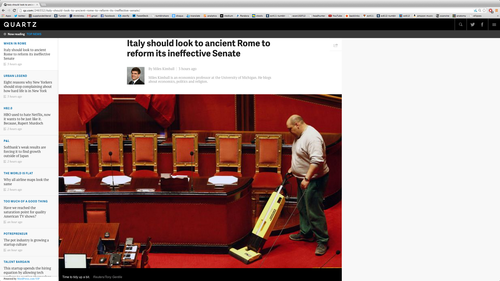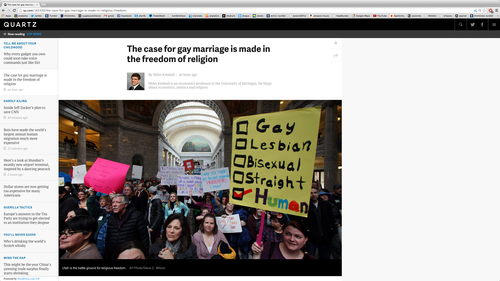Quartz #51—>Italy Should Look to Ancient Rome to Reform Its Ineffective Senate
Here is the full text of my 51st Quartz column, "Italy should look to ancient Rome to reform its ineffective Senate,“ now brought home to supplysideliberal.com. It was first published on August 8, 2014. Links to all my other columns can be found here.
The idea for this column emerged during my trip to Rome, when I talked to Luigi Guiso about the economic and political situation in Italy. I wanted to thank him for all of his insights. Don’t construe that as his endorsement of my proposal, though!
If you want to mirror the content of this post on another site, that is possible for a limited time if you read the legal notice at this link and include both a link to the original Quartz column and the following copyright notice:
© August 8, 2014: Miles Kimball, as first published on Quartz. Used by permission according to a temporary nonexclusive license expiring June 30, 2017. All rights reserved.
The prime minister of Italy, Matteo Renzi, wants to miniaturize the Italian Senate—both in number of senators and in power. Under Renzi’s reform plan, senators would be appointed by regional councils and have no power to approve budgets, pass most national laws, or hold a no confidence vote on the government.
One of the touted motivations is to save money: the equivalent of about $58 million in salaries, plus pension benefits. But even if it all added up to $100 million a year total, that would be only .005% of Italy’s $2 trillion a year economy. Any pluses or minuses for governance have to vastly outweigh the direct cost savings, so the issue should be thought of primarily as a constitutional issue, not a budgetary issue.
Italian senators are resisting. They have introduced almost 8000 amendments to Renzi’s reform bill to put the brakes on this constitutional change. This trench warfare was predictable. Back in March, James Mackenzie explained in Reuters that Renzi’s plan “to transform the Senate into a non-elected chamber stripped of the power to approve budgets or hold votes of no-confidence in a government” would meet stiff opposition:
[Renzi’s] bill would scrap the current fragmented system, which grants equal powers to the Senate and the lower house Chamber of Deputies but elects them by different rules which make it hard for any group to win a stable overall majority in parliament. …
But despite loud public calls for change from all sides of the political spectrum, the reform is expected to encounter strong opposition from many in the 320-strong upper house who will have to vote to scrap their own jobs.
Italian blogger Roberta Damiani gives an excellent primer on Renzi’s reform plan for the Italian Senate. She explains:
Currently, Italy has a system known as “perfect bicameralism”: both chambers are directly elected during the same general election, and have exactly the same authority on every matter, including monetary ones. This is really rare, especially in parliamentary systems; Italy and Romania are indeed the only two countries in the EU with such a system.
Such a system makes it hard to pass legislation. Right after Italy’s Fascist era under Mussolini, it made sense to make it hard for the government to do anything big. But now, when Italy faces a host of economic problems, that need imaginative solutions, it is a problem.
Ancient Rome provides the inspiration for a very different reform of the Italian Senate—a reform that doesn’t save any money on senators’ salaries, because it would let the senators keep their jobs, but would:
- End the gridlock caused by the current system;
- Elevate the Italian Senate as a deliberative body;
- Maintain the equality of the Senate with the other house of Parliament, the Chamber of Deputies.
The highest officials in the Roman Republic were two consuls. The consuls took turns running the show, with one consul in charge one month and the other in charge the next month. The consul who was in charge was said to hold imperium. One consul could veto the actions of the other when the other was in charge, but used that power sparingly in order to avoid being checked in turn when it was his month.
For the modern Italian Parliament, here is what I am proposing: just as consuls in Ancient Rome took turns being in charge in alternate months, let the modern Italian Senate and the other house of Parliament, the Chamber of Deputies, be in charge in alternate years. Require an active vote by 55 percent of the house of Parliament that is not in charge to veto an action by the one that is. (To minimize opposition to this reform plan, leave the number of senators the same as it is now.)
Besides an occasional veto vote, what would a house of Parliament do during its off year? Although they might shirk in their duties, members of parliament in an off year would be expected to turn their house of Parliament into a kind of think tank, preparing and thinking through the actions they planned to take in the following year when they would again collectively be in charge. Having to watch the other house of Parliament be in charge during an off year would do a lot to stimulate creativity in putting together a program for the year when their house held imperium.
Under this system, the members of parliament could all keep their jobs, as long as the voters kept reelecting them. The fact that the house of Parliament in charge could pass legislation with a simple majority vote but the other house could veto only with an active vote of 55 percent would do a lot to reduce gridlock. The years each house of Parliament would go through having to sit on the sidelines would do a lot to foster deeper deliberation.
Italy has not been an easy country to govern. I think prime minister Renzi is trying to make things better, but he chose the wrong model for constitutional reform in Italy. For a better model—one that wouldn’t face the uphill battle of persuading senators to vote their own jobs out of existence—he can turn to the ancient Roman Republic, the source of so many of the world’s key democratic principles and traditions.















